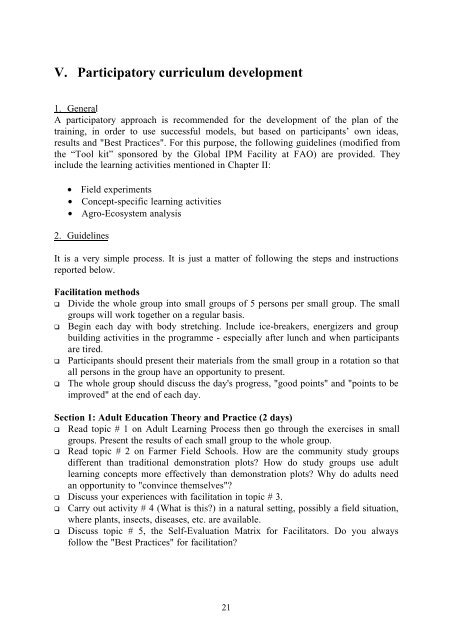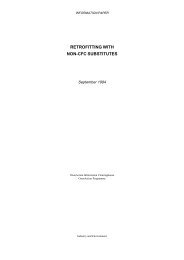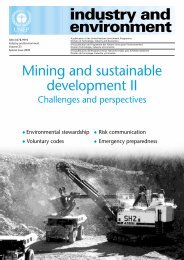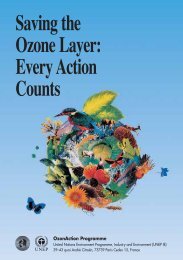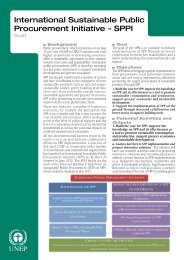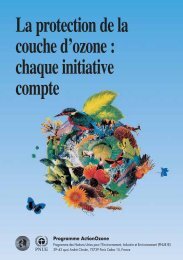Manual for Training of Extension Workers and Farmers on ... - DTIE
Manual for Training of Extension Workers and Farmers on ... - DTIE
Manual for Training of Extension Workers and Farmers on ... - DTIE
Create successful ePaper yourself
Turn your PDF publications into a flip-book with our unique Google optimized e-Paper software.
V. Participatory curriculum development<br />
1. General<br />
A participatory approach is recommended <str<strong>on</strong>g>for</str<strong>on</strong>g> the development <str<strong>on</strong>g>of</str<strong>on</strong>g> the plan <str<strong>on</strong>g>of</str<strong>on</strong>g> the<br />
training, in order to use successful models, but based <strong>on</strong> participants’ own ideas,<br />
results <str<strong>on</strong>g>and</str<strong>on</strong>g> "Best Practices". For this purpose, the following guidelines (modified from<br />
the “Tool kit” sp<strong>on</strong>sored by the Global IPM Facility at FAO) are provided. They<br />
include the learning activities menti<strong>on</strong>ed in Chapter II:<br />
• Field experiments<br />
• C<strong>on</strong>cept-specific learning activities<br />
• Agro-Ecosystem analysis<br />
2. Guidelines<br />
It is a very simple process. It is just a matter <str<strong>on</strong>g>of</str<strong>on</strong>g> following the steps <str<strong>on</strong>g>and</str<strong>on</strong>g> instructi<strong>on</strong>s<br />
reported below.<br />
Facilitati<strong>on</strong> methods<br />
q Divide the whole group into small groups <str<strong>on</strong>g>of</str<strong>on</strong>g> 5 pers<strong>on</strong>s per small group. The small<br />
groups will work together <strong>on</strong> a regular basis.<br />
q Begin each day with body stretching. Include ice-breakers, energizers <str<strong>on</strong>g>and</str<strong>on</strong>g> group<br />
building activities in the programme - especially after lunch <str<strong>on</strong>g>and</str<strong>on</strong>g> when participants<br />
are tired.<br />
q Participants should present their materials from the small group in a rotati<strong>on</strong> so that<br />
all pers<strong>on</strong>s in the group have an opportunity to present.<br />
q The whole group should discuss the day's progress, "good points" <str<strong>on</strong>g>and</str<strong>on</strong>g> "points to be<br />
improved" at the end <str<strong>on</strong>g>of</str<strong>on</strong>g> each day.<br />
Secti<strong>on</strong> 1: Adult Educati<strong>on</strong> Theory <str<strong>on</strong>g>and</str<strong>on</strong>g> Practice (2 days)<br />
q Read topic # 1 <strong>on</strong> Adult Learning Process then go through the exercises in small<br />
groups. Present the results <str<strong>on</strong>g>of</str<strong>on</strong>g> each small group to the whole group.<br />
q Read topic # 2 <strong>on</strong> Farmer Field Schools. How are the community study groups<br />
different than traditi<strong>on</strong>al dem<strong>on</strong>strati<strong>on</strong> plots? How do study groups use adult<br />
learning c<strong>on</strong>cepts more effectively than dem<strong>on</strong>strati<strong>on</strong> plots? Why do adults need<br />
an opportunity to "c<strong>on</strong>vince themselves"?<br />
q Discuss your experiences with facilitati<strong>on</strong> in topic # 3.<br />
q Carry out activity # 4 (What is this?) in a natural setting, possibly a field situati<strong>on</strong>,<br />
where plants, insects, diseases, etc. are available.<br />
q Discuss topic # 5, the Self-Evaluati<strong>on</strong> Matrix <str<strong>on</strong>g>for</str<strong>on</strong>g> Facilitators. Do you always<br />
follow the "Best Practices" <str<strong>on</strong>g>for</str<strong>on</strong>g> facilitati<strong>on</strong>?<br />
21


